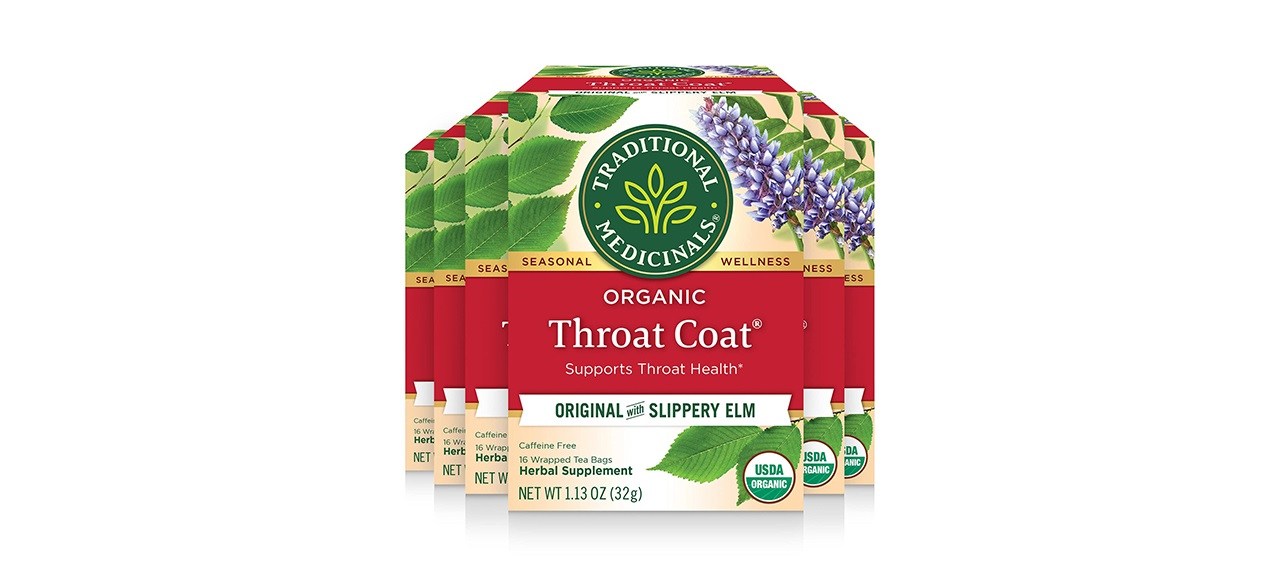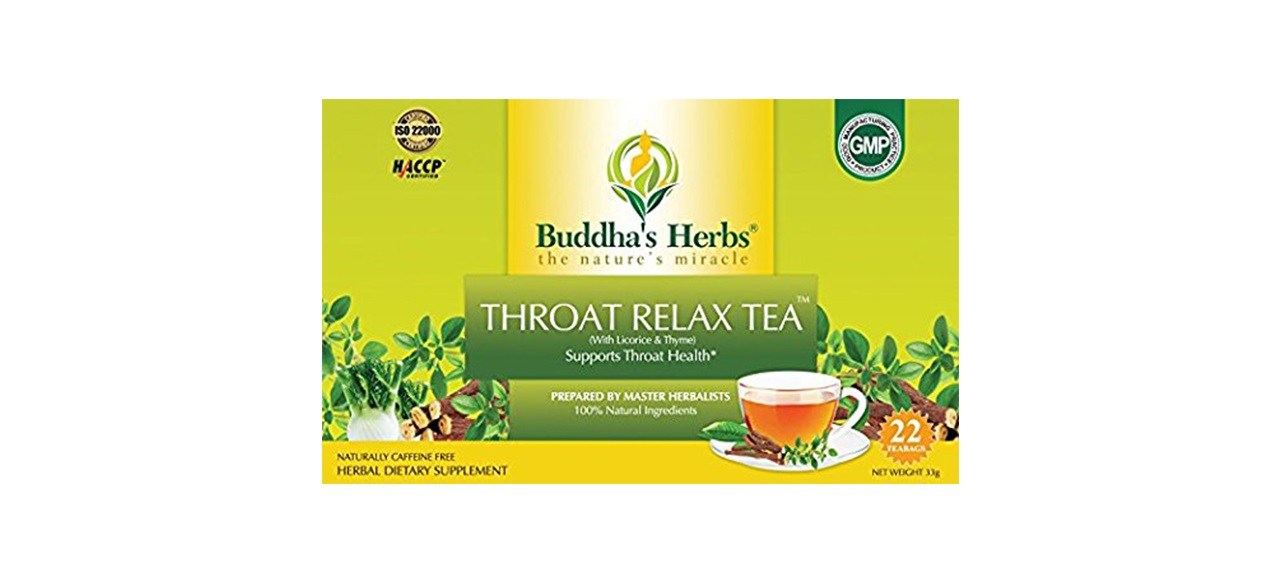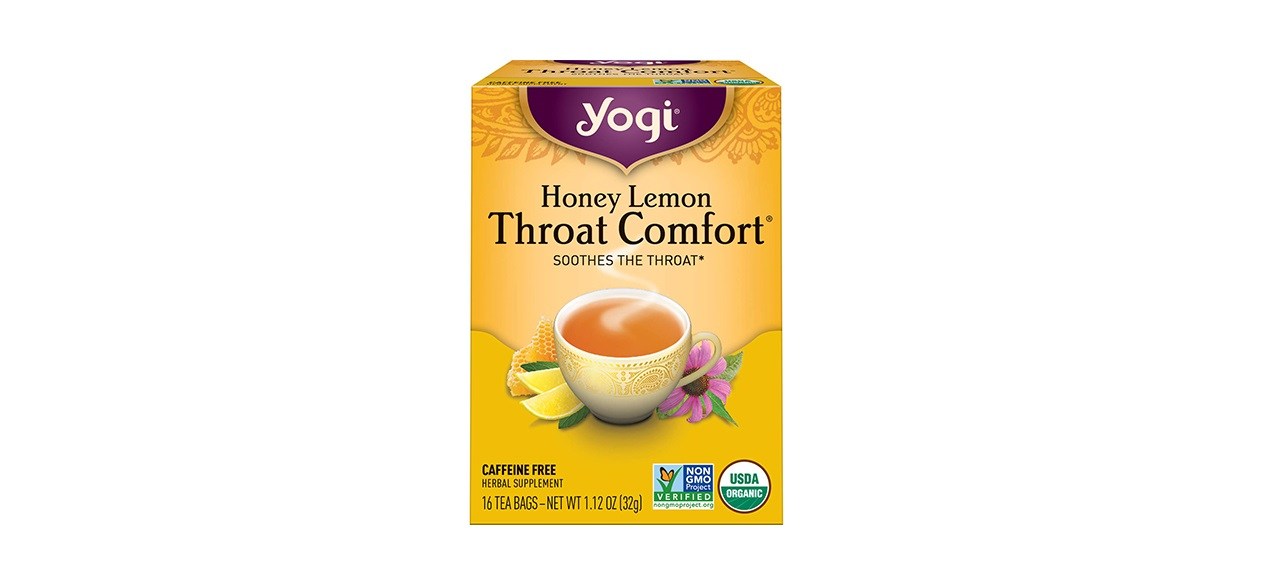Which tea for a sore throat is best?
Whether it’s merely a symptom of too much talking or a more serious illness, hot tea can soothe the pain of a sore throat. Any hot beverage will do the trick, although the right herbal teas can act as mild cough suppressants or painkillers, making them a pleasant and effective remedy.
A top tea for a sore throat is Traditional Medicinals Organic Throat Coat Tea, which uses a blend of licorice root and slippery elm bark for a natural healing tea with a sweet taste.
What to know before you buy tea for a sore throat
Types of tea
Teas come in many different varieties. The term “tea” refers specifically to black and green teas made from the Camellia sinensis plant, harvested and aged at different times and rates. Herbal teas, or tisanes, are also common, and these provide the most soothing effects for a sore throat. Black and green tea contain caffeine, while most herbal teas are caffeine-free.
Flavoring
Some herbal teas have natural or artificial flavoring added, either to mask the taste of the herbs used or simply to make the beverage more interesting to drink. In sore throat teas, flavorings like lemon or honey are common. If you’re sensitive to flavoring or want the purest possible tea, keep an eye out for these to avoid them. If you dislike the taste of the herbs, flavoring can improve the experience of drinking tea.
What to look for in a quality tea for a sore throat
Active herbal ingredients
There are a number of herbs and plants commonly used in sore throat teas, from different sources and with various properties. With all herbal remedies, check carefully to make sure it’s coming from a trustworthy source and make sure it won’t interact with any medications or other conditions before using.
- Slippery elm: Slippery elm is native to eastern North America and has long been a staple of herbal medicine in the Americas. The inner bark of the slippery elm tree contains a demulcent that can coat and soothe an irritated throat.
- Wild cherry: Prunus avium, native to Europe and Asia, has natural sedative and cough-suppressant properties. It’s less commonly found in teas than some other ingredients but can be sought out easily.
- Licorice root: Native to Asia, Africa and Europe, licorice root has a sweet, pleasant flavor, though it may not be to everyone’s taste. It can also reduce mucus, decrease swelling and suppress a cough.
- Marshmallow root: Marshmallow root is another commonly used ingredient in sore throat remedies, native to Europe, Asia and Africa. It’s used to relieve the pain of irritated mucous membranes and as a general cough and cold remedy.
Ingredient sources
Check to see where the herbs used in herbal teas are sourced from, as this can make or break the actual healing properties of the tea. The highest-quality teas for sore throats should be clear about where their ingredients come from and may highlight that they’re organically and sustainably sourced.
How much you can expect to spend on tea for a sore throat
Most teas for sore throats are relatively affordable, at roughly $0.25-$0.50 per bag, and they can be bought in bulk for extra savings.
Tea for a sore throat FAQ
Can sore throat teas interact with any medication?
A. It’s very possible, though different herbs all have different properties. Since many commercially available teas for sore throats use a blend of herbs, you’ll need to check each one used to make sure it won’t interact with your medication. It’s wise to speak to a medical professional if you have concerns.
How long should you steep sore throat tea?
A. It depends on the herbs in question, especially if it’s a blend, but most herbal teas need to steep for considerably longer than black or green tea, which usually only need one to three minutes depending on how strong you like it. Usually, herbal tea needs a minimum of five minutes, with some infusions needing up to 10 to extract all the flavor and healing properties from the dried ingredients.
What’s the best tea for a sore throat to buy?
Top tea for a sore throat
Traditional Medicinals Organic Throat Coat Tea
What you need to know: This is an organic tea with licorice root and slippery elm bark for healing power and a sweet taste.
What you’ll love: It’s organic, sustainably sourced and affordable. The slippery elm bark acts as a natural cough suppressant.
What you should consider: It has a strong licorice flavor, which may not be everyone’s preference.
Where to buy: Sold by Amazon
Top tea for a sore throat for the money
Buddha’s Herbs Throat Relax Tea
What you need to know: This tea includes licorice, fennel root and thyme to relax and soothe throat irritation.
What you’ll love: The combination of licorice and fennel gives it a sweet flavor, and thyme is a natural antiseptic, making it a great combination for sore throats.
What you should consider: Some reviewers found the tea bags to be of poor quality and noted they didn’t hold up well to heavy use.
Where to buy: Sold by Amazon
Worth checking out
Yogi Tea Honey Lemon Throat Comfort Tea
What you need to know: This lemon and honey flavored tea uses echinacea, slippery elm bark and wild cherry bark for powerful healing and great flavor.
What you’ll love: The slippery elm and cherry bark provide a slightly numbing effect, and it has a pleasant flavor due to the lemon and honey. It’s less licorice-forward than many other sore-throat teas.
What you should consider: It contains natural honey and lemon flavoring, so it’s not pure herbal tea. Some may dislike the texture of slippery elm.
Where to buy: Sold by Amazon
Want to shop the best products at the best prices? Check out Daily Deals from BestReviews.
Sign up here to receive the BestReviews weekly newsletter for useful advice on new products and noteworthy deals.
Arabella Matthews writes for BestReviews. BestReviews has helped millions of consumers simplify their purchasing decisions, saving them time and money.
Copyright 2023 BestReviews, a Nexstar company. All rights reserved.






